Impacts of Colonialism in Malaysia
VerifiedAdded on 2022/11/22
|8
|2047
|261
AI Summary
This study examines the positive and negative effects of colonialism on the Southeast Asian country of Malaysia. The after effects of British rule over Malaysia will be thoroughly analyzed whilst keeping an eye on Malaysia’s growth and development throughout its colonial domination.
Contribute Materials
Your contribution can guide someone’s learning journey. Share your
documents today.
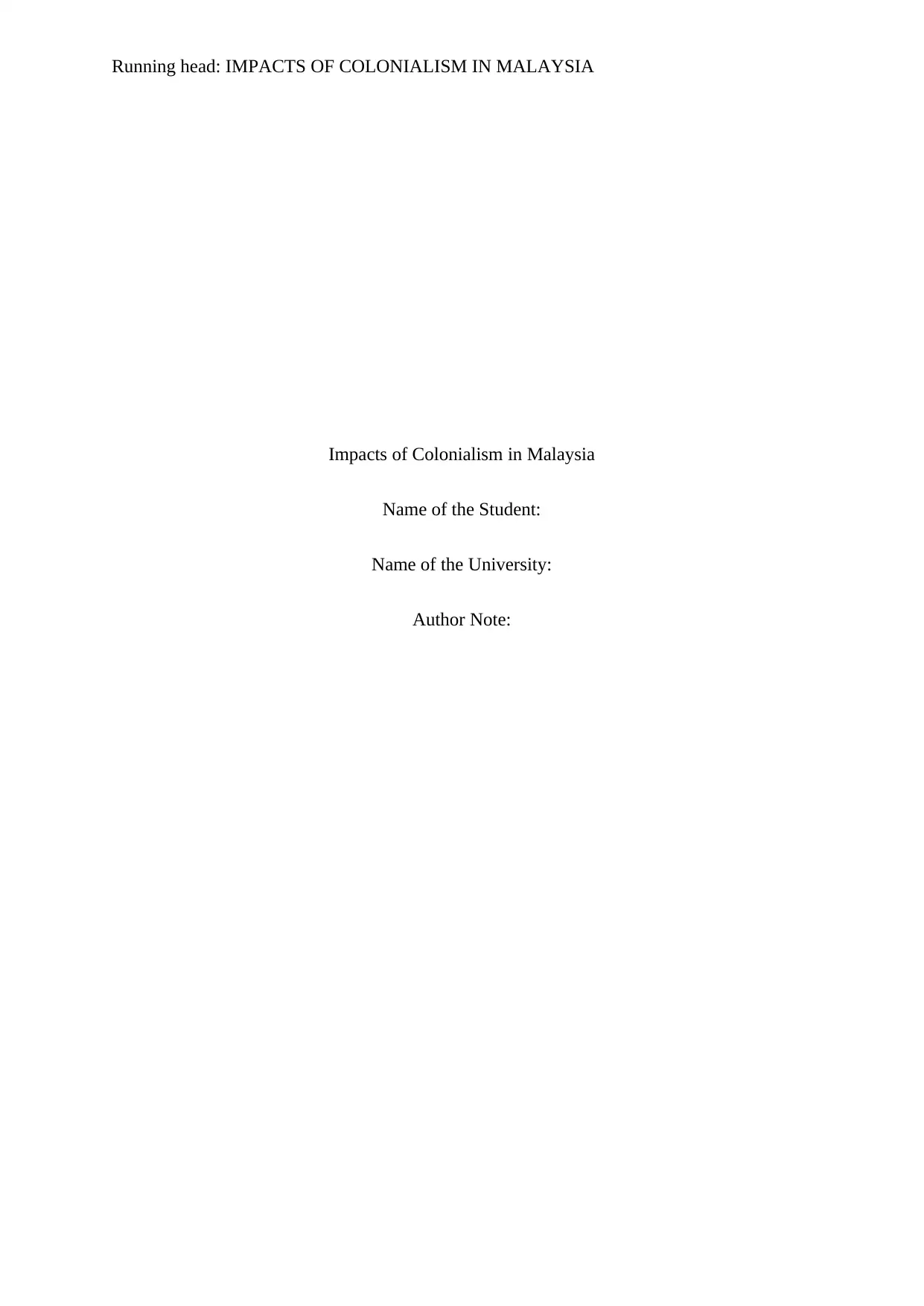
Running head: IMPACTS OF COLONIALISM IN MALAYSIA
Impacts of Colonialism in Malaysia
Name of the Student:
Name of the University:
Author Note:
Impacts of Colonialism in Malaysia
Name of the Student:
Name of the University:
Author Note:
Secure Best Marks with AI Grader
Need help grading? Try our AI Grader for instant feedback on your assignments.
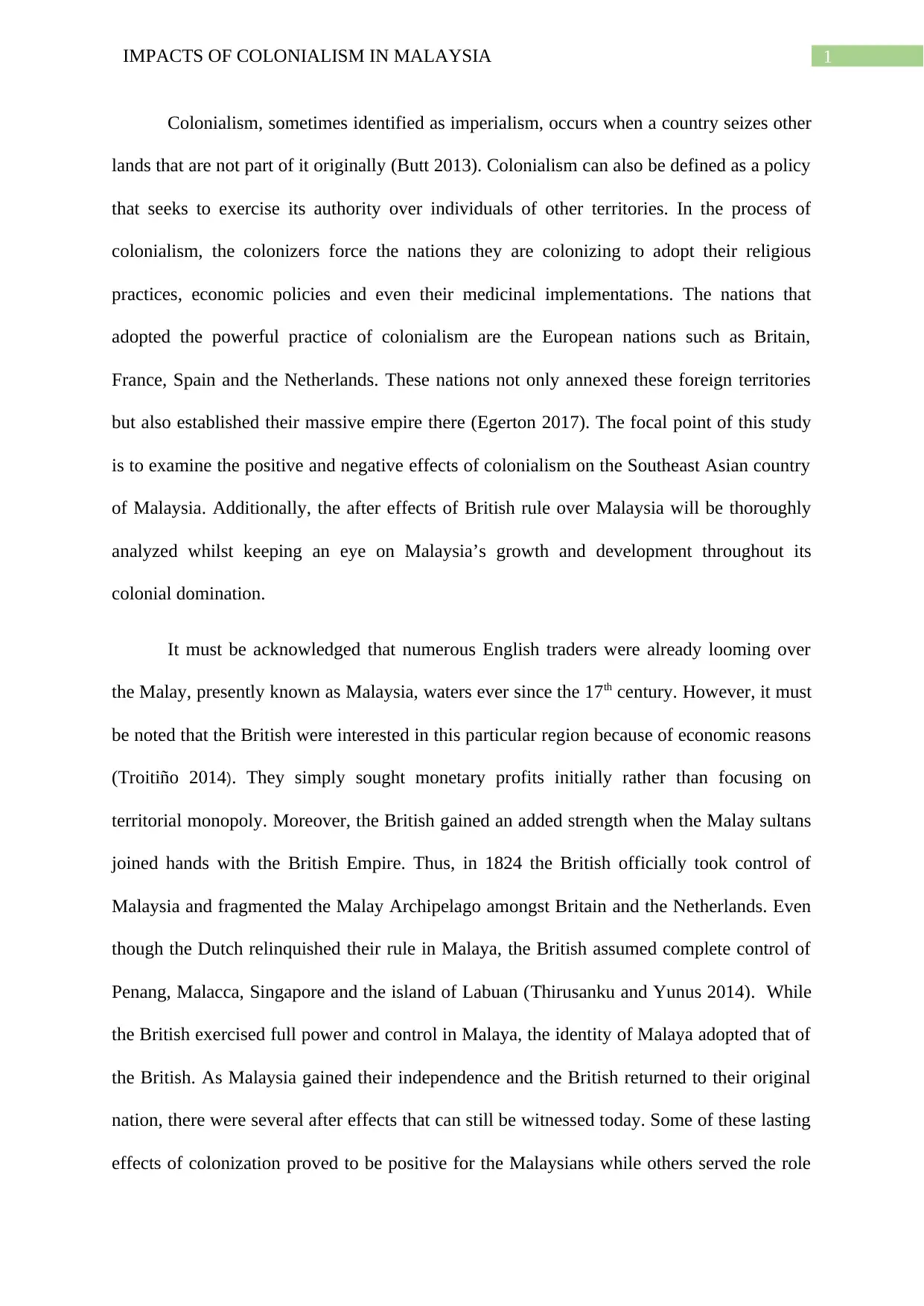
1IMPACTS OF COLONIALISM IN MALAYSIA
Colonialism, sometimes identified as imperialism, occurs when a country seizes other
lands that are not part of it originally (Butt 2013). Colonialism can also be defined as a policy
that seeks to exercise its authority over individuals of other territories. In the process of
colonialism, the colonizers force the nations they are colonizing to adopt their religious
practices, economic policies and even their medicinal implementations. The nations that
adopted the powerful practice of colonialism are the European nations such as Britain,
France, Spain and the Netherlands. These nations not only annexed these foreign territories
but also established their massive empire there (Egerton 2017). The focal point of this study
is to examine the positive and negative effects of colonialism on the Southeast Asian country
of Malaysia. Additionally, the after effects of British rule over Malaysia will be thoroughly
analyzed whilst keeping an eye on Malaysia’s growth and development throughout its
colonial domination.
It must be acknowledged that numerous English traders were already looming over
the Malay, presently known as Malaysia, waters ever since the 17th century. However, it must
be noted that the British were interested in this particular region because of economic reasons
(Troitiño 2014). They simply sought monetary profits initially rather than focusing on
territorial monopoly. Moreover, the British gained an added strength when the Malay sultans
joined hands with the British Empire. Thus, in 1824 the British officially took control of
Malaysia and fragmented the Malay Archipelago amongst Britain and the Netherlands. Even
though the Dutch relinquished their rule in Malaya, the British assumed complete control of
Penang, Malacca, Singapore and the island of Labuan (Thirusanku and Yunus 2014). While
the British exercised full power and control in Malaya, the identity of Malaya adopted that of
the British. As Malaysia gained their independence and the British returned to their original
nation, there were several after effects that can still be witnessed today. Some of these lasting
effects of colonization proved to be positive for the Malaysians while others served the role
Colonialism, sometimes identified as imperialism, occurs when a country seizes other
lands that are not part of it originally (Butt 2013). Colonialism can also be defined as a policy
that seeks to exercise its authority over individuals of other territories. In the process of
colonialism, the colonizers force the nations they are colonizing to adopt their religious
practices, economic policies and even their medicinal implementations. The nations that
adopted the powerful practice of colonialism are the European nations such as Britain,
France, Spain and the Netherlands. These nations not only annexed these foreign territories
but also established their massive empire there (Egerton 2017). The focal point of this study
is to examine the positive and negative effects of colonialism on the Southeast Asian country
of Malaysia. Additionally, the after effects of British rule over Malaysia will be thoroughly
analyzed whilst keeping an eye on Malaysia’s growth and development throughout its
colonial domination.
It must be acknowledged that numerous English traders were already looming over
the Malay, presently known as Malaysia, waters ever since the 17th century. However, it must
be noted that the British were interested in this particular region because of economic reasons
(Troitiño 2014). They simply sought monetary profits initially rather than focusing on
territorial monopoly. Moreover, the British gained an added strength when the Malay sultans
joined hands with the British Empire. Thus, in 1824 the British officially took control of
Malaysia and fragmented the Malay Archipelago amongst Britain and the Netherlands. Even
though the Dutch relinquished their rule in Malaya, the British assumed complete control of
Penang, Malacca, Singapore and the island of Labuan (Thirusanku and Yunus 2014). While
the British exercised full power and control in Malaya, the identity of Malaya adopted that of
the British. As Malaysia gained their independence and the British returned to their original
nation, there were several after effects that can still be witnessed today. Some of these lasting
effects of colonization proved to be positive for the Malaysians while others served the role
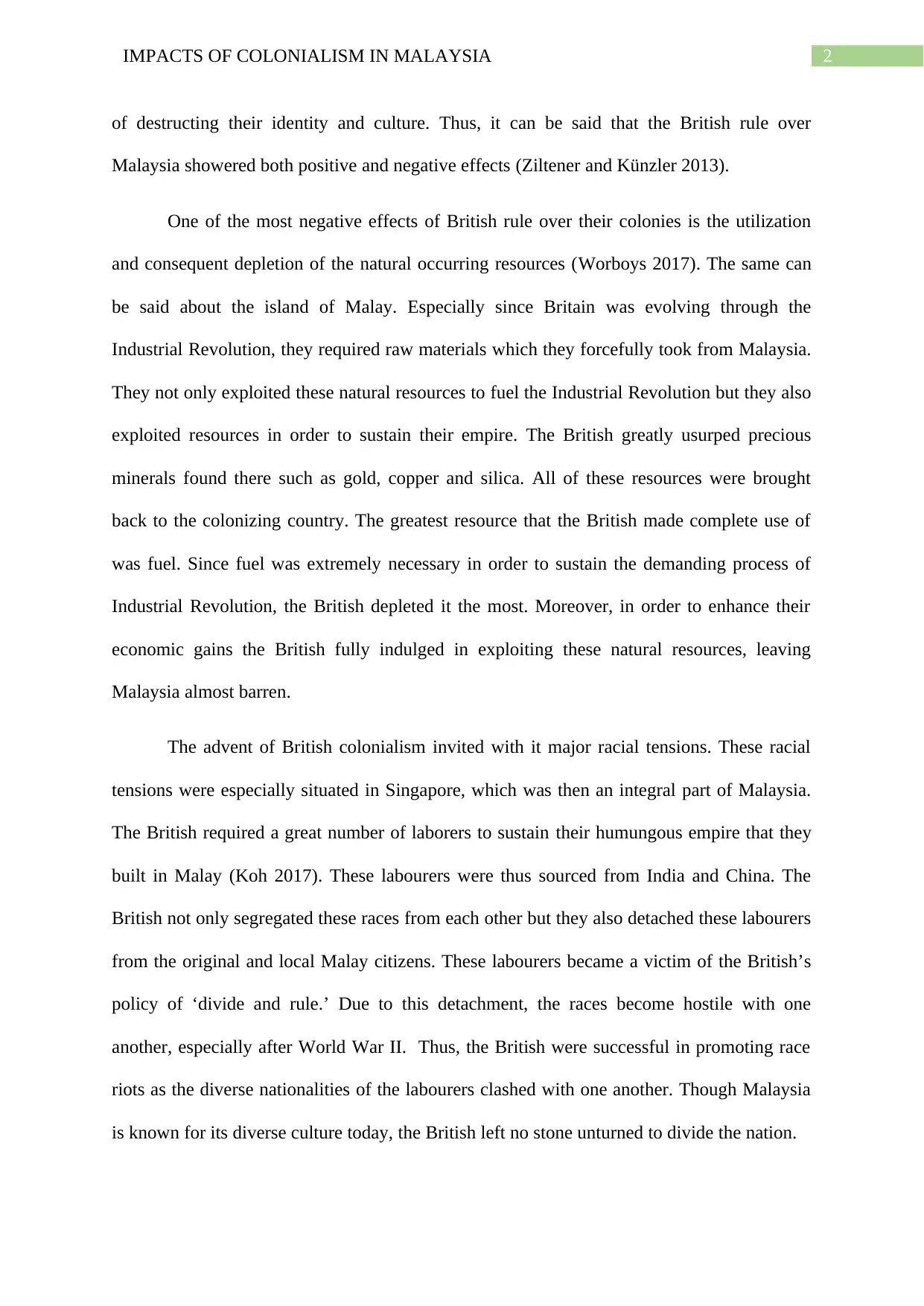
2IMPACTS OF COLONIALISM IN MALAYSIA
of destructing their identity and culture. Thus, it can be said that the British rule over
Malaysia showered both positive and negative effects (Ziltener and Künzler 2013).
One of the most negative effects of British rule over their colonies is the utilization
and consequent depletion of the natural occurring resources (Worboys 2017). The same can
be said about the island of Malay. Especially since Britain was evolving through the
Industrial Revolution, they required raw materials which they forcefully took from Malaysia.
They not only exploited these natural resources to fuel the Industrial Revolution but they also
exploited resources in order to sustain their empire. The British greatly usurped precious
minerals found there such as gold, copper and silica. All of these resources were brought
back to the colonizing country. The greatest resource that the British made complete use of
was fuel. Since fuel was extremely necessary in order to sustain the demanding process of
Industrial Revolution, the British depleted it the most. Moreover, in order to enhance their
economic gains the British fully indulged in exploiting these natural resources, leaving
Malaysia almost barren.
The advent of British colonialism invited with it major racial tensions. These racial
tensions were especially situated in Singapore, which was then an integral part of Malaysia.
The British required a great number of laborers to sustain their humungous empire that they
built in Malay (Koh 2017). These labourers were thus sourced from India and China. The
British not only segregated these races from each other but they also detached these labourers
from the original and local Malay citizens. These labourers became a victim of the British’s
policy of ‘divide and rule.’ Due to this detachment, the races become hostile with one
another, especially after World War II. Thus, the British were successful in promoting race
riots as the diverse nationalities of the labourers clashed with one another. Though Malaysia
is known for its diverse culture today, the British left no stone unturned to divide the nation.
of destructing their identity and culture. Thus, it can be said that the British rule over
Malaysia showered both positive and negative effects (Ziltener and Künzler 2013).
One of the most negative effects of British rule over their colonies is the utilization
and consequent depletion of the natural occurring resources (Worboys 2017). The same can
be said about the island of Malay. Especially since Britain was evolving through the
Industrial Revolution, they required raw materials which they forcefully took from Malaysia.
They not only exploited these natural resources to fuel the Industrial Revolution but they also
exploited resources in order to sustain their empire. The British greatly usurped precious
minerals found there such as gold, copper and silica. All of these resources were brought
back to the colonizing country. The greatest resource that the British made complete use of
was fuel. Since fuel was extremely necessary in order to sustain the demanding process of
Industrial Revolution, the British depleted it the most. Moreover, in order to enhance their
economic gains the British fully indulged in exploiting these natural resources, leaving
Malaysia almost barren.
The advent of British colonialism invited with it major racial tensions. These racial
tensions were especially situated in Singapore, which was then an integral part of Malaysia.
The British required a great number of laborers to sustain their humungous empire that they
built in Malay (Koh 2017). These labourers were thus sourced from India and China. The
British not only segregated these races from each other but they also detached these labourers
from the original and local Malay citizens. These labourers became a victim of the British’s
policy of ‘divide and rule.’ Due to this detachment, the races become hostile with one
another, especially after World War II. Thus, the British were successful in promoting race
riots as the diverse nationalities of the labourers clashed with one another. Though Malaysia
is known for its diverse culture today, the British left no stone unturned to divide the nation.
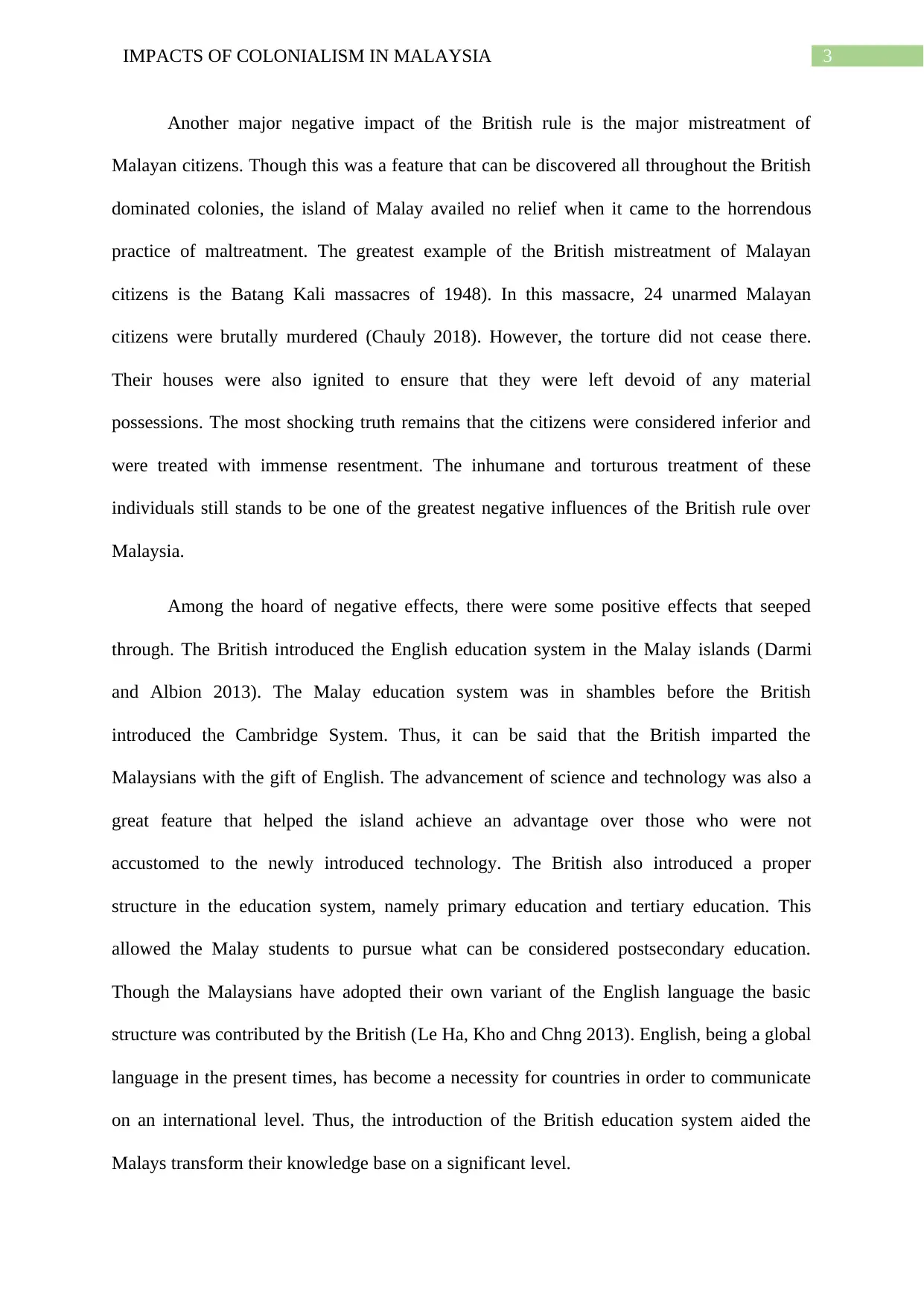
3IMPACTS OF COLONIALISM IN MALAYSIA
Another major negative impact of the British rule is the major mistreatment of
Malayan citizens. Though this was a feature that can be discovered all throughout the British
dominated colonies, the island of Malay availed no relief when it came to the horrendous
practice of maltreatment. The greatest example of the British mistreatment of Malayan
citizens is the Batang Kali massacres of 1948). In this massacre, 24 unarmed Malayan
citizens were brutally murdered (Chauly 2018). However, the torture did not cease there.
Their houses were also ignited to ensure that they were left devoid of any material
possessions. The most shocking truth remains that the citizens were considered inferior and
were treated with immense resentment. The inhumane and torturous treatment of these
individuals still stands to be one of the greatest negative influences of the British rule over
Malaysia.
Among the hoard of negative effects, there were some positive effects that seeped
through. The British introduced the English education system in the Malay islands (Darmi
and Albion 2013). The Malay education system was in shambles before the British
introduced the Cambridge System. Thus, it can be said that the British imparted the
Malaysians with the gift of English. The advancement of science and technology was also a
great feature that helped the island achieve an advantage over those who were not
accustomed to the newly introduced technology. The British also introduced a proper
structure in the education system, namely primary education and tertiary education. This
allowed the Malay students to pursue what can be considered postsecondary education.
Though the Malaysians have adopted their own variant of the English language the basic
structure was contributed by the British (Le Ha, Kho and Chng 2013). English, being a global
language in the present times, has become a necessity for countries in order to communicate
on an international level. Thus, the introduction of the British education system aided the
Malays transform their knowledge base on a significant level.
Another major negative impact of the British rule is the major mistreatment of
Malayan citizens. Though this was a feature that can be discovered all throughout the British
dominated colonies, the island of Malay availed no relief when it came to the horrendous
practice of maltreatment. The greatest example of the British mistreatment of Malayan
citizens is the Batang Kali massacres of 1948). In this massacre, 24 unarmed Malayan
citizens were brutally murdered (Chauly 2018). However, the torture did not cease there.
Their houses were also ignited to ensure that they were left devoid of any material
possessions. The most shocking truth remains that the citizens were considered inferior and
were treated with immense resentment. The inhumane and torturous treatment of these
individuals still stands to be one of the greatest negative influences of the British rule over
Malaysia.
Among the hoard of negative effects, there were some positive effects that seeped
through. The British introduced the English education system in the Malay islands (Darmi
and Albion 2013). The Malay education system was in shambles before the British
introduced the Cambridge System. Thus, it can be said that the British imparted the
Malaysians with the gift of English. The advancement of science and technology was also a
great feature that helped the island achieve an advantage over those who were not
accustomed to the newly introduced technology. The British also introduced a proper
structure in the education system, namely primary education and tertiary education. This
allowed the Malay students to pursue what can be considered postsecondary education.
Though the Malaysians have adopted their own variant of the English language the basic
structure was contributed by the British (Le Ha, Kho and Chng 2013). English, being a global
language in the present times, has become a necessity for countries in order to communicate
on an international level. Thus, the introduction of the British education system aided the
Malays transform their knowledge base on a significant level.
Secure Best Marks with AI Grader
Need help grading? Try our AI Grader for instant feedback on your assignments.
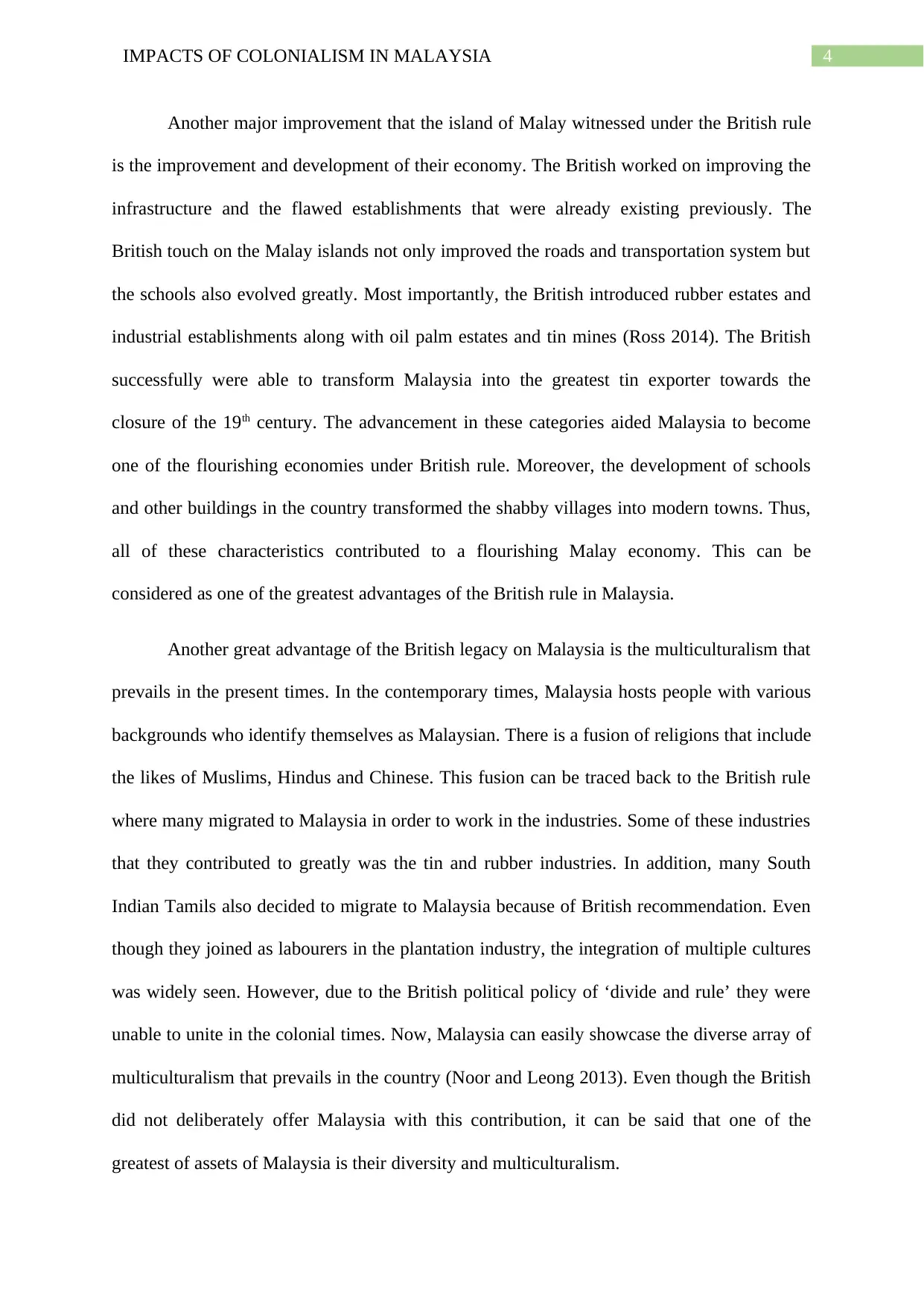
4IMPACTS OF COLONIALISM IN MALAYSIA
Another major improvement that the island of Malay witnessed under the British rule
is the improvement and development of their economy. The British worked on improving the
infrastructure and the flawed establishments that were already existing previously. The
British touch on the Malay islands not only improved the roads and transportation system but
the schools also evolved greatly. Most importantly, the British introduced rubber estates and
industrial establishments along with oil palm estates and tin mines (Ross 2014). The British
successfully were able to transform Malaysia into the greatest tin exporter towards the
closure of the 19th century. The advancement in these categories aided Malaysia to become
one of the flourishing economies under British rule. Moreover, the development of schools
and other buildings in the country transformed the shabby villages into modern towns. Thus,
all of these characteristics contributed to a flourishing Malay economy. This can be
considered as one of the greatest advantages of the British rule in Malaysia.
Another great advantage of the British legacy on Malaysia is the multiculturalism that
prevails in the present times. In the contemporary times, Malaysia hosts people with various
backgrounds who identify themselves as Malaysian. There is a fusion of religions that include
the likes of Muslims, Hindus and Chinese. This fusion can be traced back to the British rule
where many migrated to Malaysia in order to work in the industries. Some of these industries
that they contributed to greatly was the tin and rubber industries. In addition, many South
Indian Tamils also decided to migrate to Malaysia because of British recommendation. Even
though they joined as labourers in the plantation industry, the integration of multiple cultures
was widely seen. However, due to the British political policy of ‘divide and rule’ they were
unable to unite in the colonial times. Now, Malaysia can easily showcase the diverse array of
multiculturalism that prevails in the country (Noor and Leong 2013). Even though the British
did not deliberately offer Malaysia with this contribution, it can be said that one of the
greatest of assets of Malaysia is their diversity and multiculturalism.
Another major improvement that the island of Malay witnessed under the British rule
is the improvement and development of their economy. The British worked on improving the
infrastructure and the flawed establishments that were already existing previously. The
British touch on the Malay islands not only improved the roads and transportation system but
the schools also evolved greatly. Most importantly, the British introduced rubber estates and
industrial establishments along with oil palm estates and tin mines (Ross 2014). The British
successfully were able to transform Malaysia into the greatest tin exporter towards the
closure of the 19th century. The advancement in these categories aided Malaysia to become
one of the flourishing economies under British rule. Moreover, the development of schools
and other buildings in the country transformed the shabby villages into modern towns. Thus,
all of these characteristics contributed to a flourishing Malay economy. This can be
considered as one of the greatest advantages of the British rule in Malaysia.
Another great advantage of the British legacy on Malaysia is the multiculturalism that
prevails in the present times. In the contemporary times, Malaysia hosts people with various
backgrounds who identify themselves as Malaysian. There is a fusion of religions that include
the likes of Muslims, Hindus and Chinese. This fusion can be traced back to the British rule
where many migrated to Malaysia in order to work in the industries. Some of these industries
that they contributed to greatly was the tin and rubber industries. In addition, many South
Indian Tamils also decided to migrate to Malaysia because of British recommendation. Even
though they joined as labourers in the plantation industry, the integration of multiple cultures
was widely seen. However, due to the British political policy of ‘divide and rule’ they were
unable to unite in the colonial times. Now, Malaysia can easily showcase the diverse array of
multiculturalism that prevails in the country (Noor and Leong 2013). Even though the British
did not deliberately offer Malaysia with this contribution, it can be said that one of the
greatest of assets of Malaysia is their diversity and multiculturalism.
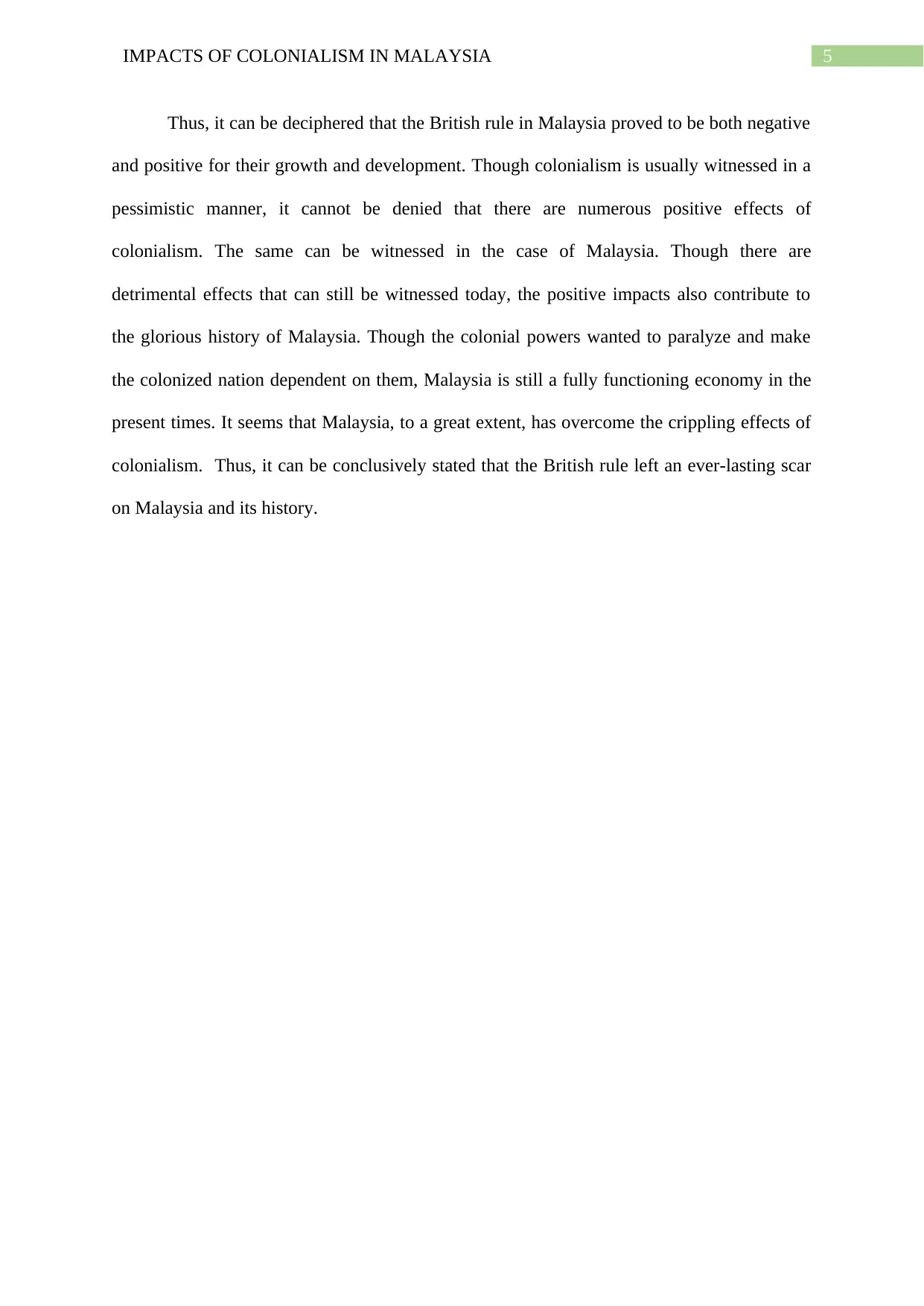
5IMPACTS OF COLONIALISM IN MALAYSIA
Thus, it can be deciphered that the British rule in Malaysia proved to be both negative
and positive for their growth and development. Though colonialism is usually witnessed in a
pessimistic manner, it cannot be denied that there are numerous positive effects of
colonialism. The same can be witnessed in the case of Malaysia. Though there are
detrimental effects that can still be witnessed today, the positive impacts also contribute to
the glorious history of Malaysia. Though the colonial powers wanted to paralyze and make
the colonized nation dependent on them, Malaysia is still a fully functioning economy in the
present times. It seems that Malaysia, to a great extent, has overcome the crippling effects of
colonialism. Thus, it can be conclusively stated that the British rule left an ever-lasting scar
on Malaysia and its history.
Thus, it can be deciphered that the British rule in Malaysia proved to be both negative
and positive for their growth and development. Though colonialism is usually witnessed in a
pessimistic manner, it cannot be denied that there are numerous positive effects of
colonialism. The same can be witnessed in the case of Malaysia. Though there are
detrimental effects that can still be witnessed today, the positive impacts also contribute to
the glorious history of Malaysia. Though the colonial powers wanted to paralyze and make
the colonized nation dependent on them, Malaysia is still a fully functioning economy in the
present times. It seems that Malaysia, to a great extent, has overcome the crippling effects of
colonialism. Thus, it can be conclusively stated that the British rule left an ever-lasting scar
on Malaysia and its history.
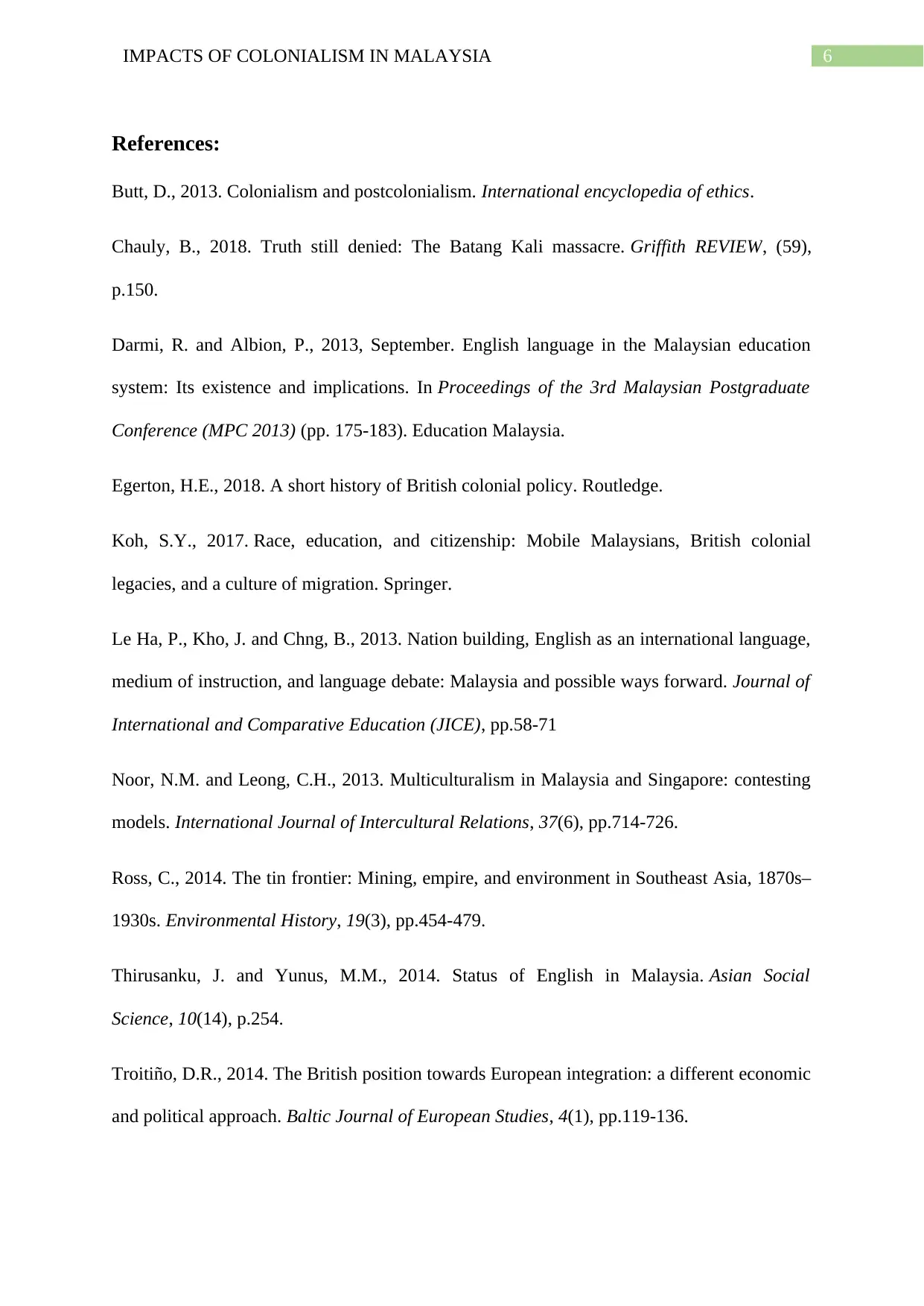
6IMPACTS OF COLONIALISM IN MALAYSIA
References:
Butt, D., 2013. Colonialism and postcolonialism. International encyclopedia of ethics.
Chauly, B., 2018. Truth still denied: The Batang Kali massacre. Griffith REVIEW, (59),
p.150.
Darmi, R. and Albion, P., 2013, September. English language in the Malaysian education
system: Its existence and implications. In Proceedings of the 3rd Malaysian Postgraduate
Conference (MPC 2013) (pp. 175-183). Education Malaysia.
Egerton, H.E., 2018. A short history of British colonial policy. Routledge.
Koh, S.Y., 2017. Race, education, and citizenship: Mobile Malaysians, British colonial
legacies, and a culture of migration. Springer.
Le Ha, P., Kho, J. and Chng, B., 2013. Nation building, English as an international language,
medium of instruction, and language debate: Malaysia and possible ways forward. Journal of
International and Comparative Education (JICE), pp.58-71
Noor, N.M. and Leong, C.H., 2013. Multiculturalism in Malaysia and Singapore: contesting
models. International Journal of Intercultural Relations, 37(6), pp.714-726.
Ross, C., 2014. The tin frontier: Mining, empire, and environment in Southeast Asia, 1870s–
1930s. Environmental History, 19(3), pp.454-479.
Thirusanku, J. and Yunus, M.M., 2014. Status of English in Malaysia. Asian Social
Science, 10(14), p.254.
Troitiño, D.R., 2014. The British position towards European integration: a different economic
and political approach. Baltic Journal of European Studies, 4(1), pp.119-136.
References:
Butt, D., 2013. Colonialism and postcolonialism. International encyclopedia of ethics.
Chauly, B., 2018. Truth still denied: The Batang Kali massacre. Griffith REVIEW, (59),
p.150.
Darmi, R. and Albion, P., 2013, September. English language in the Malaysian education
system: Its existence and implications. In Proceedings of the 3rd Malaysian Postgraduate
Conference (MPC 2013) (pp. 175-183). Education Malaysia.
Egerton, H.E., 2018. A short history of British colonial policy. Routledge.
Koh, S.Y., 2017. Race, education, and citizenship: Mobile Malaysians, British colonial
legacies, and a culture of migration. Springer.
Le Ha, P., Kho, J. and Chng, B., 2013. Nation building, English as an international language,
medium of instruction, and language debate: Malaysia and possible ways forward. Journal of
International and Comparative Education (JICE), pp.58-71
Noor, N.M. and Leong, C.H., 2013. Multiculturalism in Malaysia and Singapore: contesting
models. International Journal of Intercultural Relations, 37(6), pp.714-726.
Ross, C., 2014. The tin frontier: Mining, empire, and environment in Southeast Asia, 1870s–
1930s. Environmental History, 19(3), pp.454-479.
Thirusanku, J. and Yunus, M.M., 2014. Status of English in Malaysia. Asian Social
Science, 10(14), p.254.
Troitiño, D.R., 2014. The British position towards European integration: a different economic
and political approach. Baltic Journal of European Studies, 4(1), pp.119-136.
Paraphrase This Document
Need a fresh take? Get an instant paraphrase of this document with our AI Paraphraser
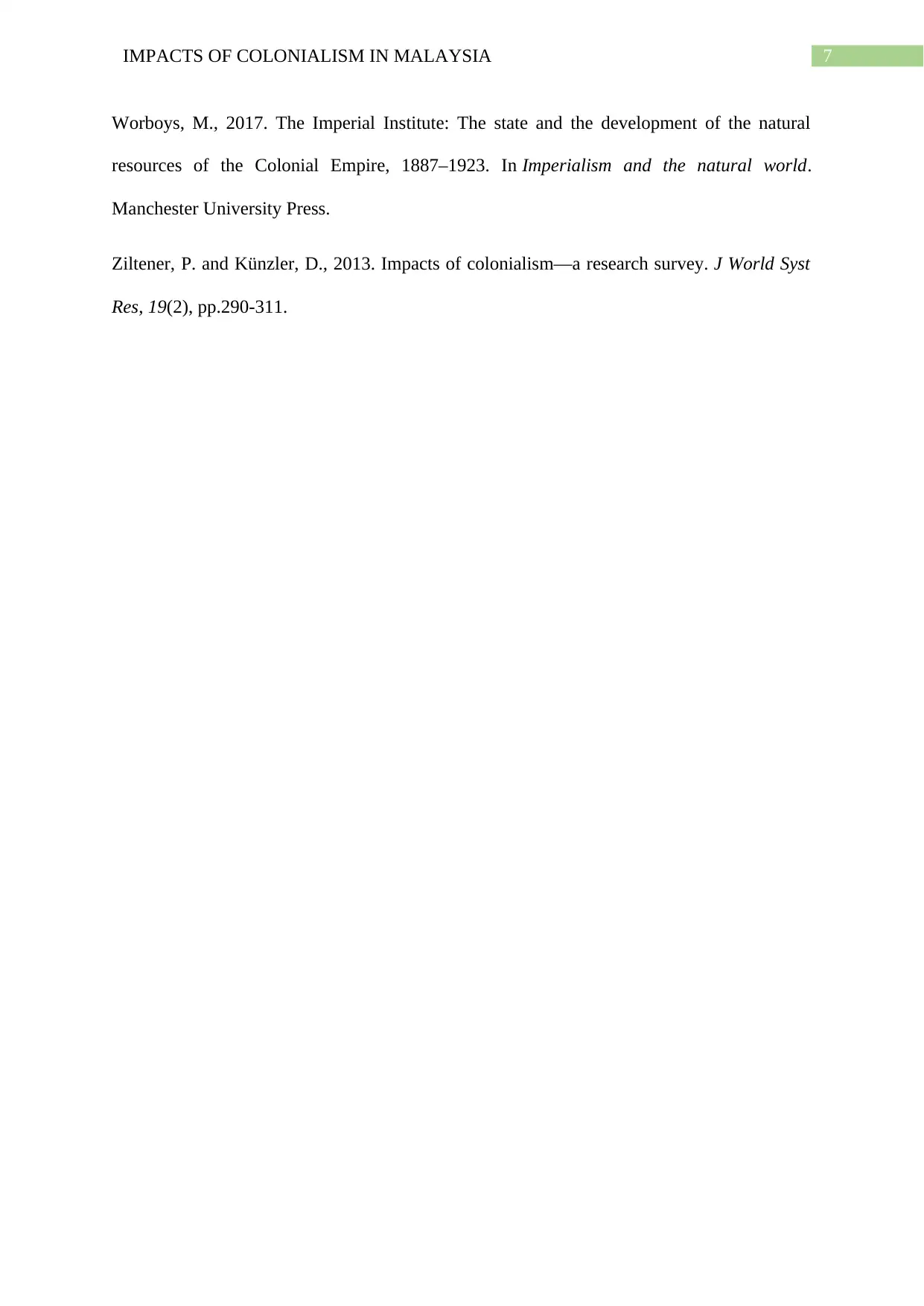
7IMPACTS OF COLONIALISM IN MALAYSIA
Worboys, M., 2017. The Imperial Institute: The state and the development of the natural
resources of the Colonial Empire, 1887–1923. In Imperialism and the natural world.
Manchester University Press.
Ziltener, P. and Künzler, D., 2013. Impacts of colonialism—a research survey. J World Syst
Res, 19(2), pp.290-311.
Worboys, M., 2017. The Imperial Institute: The state and the development of the natural
resources of the Colonial Empire, 1887–1923. In Imperialism and the natural world.
Manchester University Press.
Ziltener, P. and Künzler, D., 2013. Impacts of colonialism—a research survey. J World Syst
Res, 19(2), pp.290-311.
1 out of 8
Related Documents
Your All-in-One AI-Powered Toolkit for Academic Success.
+13062052269
info@desklib.com
Available 24*7 on WhatsApp / Email
![[object Object]](/_next/static/media/star-bottom.7253800d.svg)
Unlock your academic potential
© 2024 | Zucol Services PVT LTD | All rights reserved.





